 
|
||||
|
|
ZANOV |
|||
|
A fitting sequel to the shapeshifting Chaos Islands era, the 2023 release of Lost In The Future is nevertheless an amazing sounding album that will appeal to Zanov’s core fans as well as those listeners that appreciate other modern era synth masters from pioneering electronica countries such as France and Germany. With song titles like “Conscious Machines”, “Brain To Brain”, “Living With Robots” and “Interstellar Travel” to name just a few, Lost In The Future may depict a dystopian future for the human race, yet it’s done with skillful precision that unquestionably reflects Zanov’s mastery of modern day synth-based electronica. On the 7-track 45-minute Lost In The Future, Zanov employs an arsenal of custom synth keyboards and all manners of computerized programs and the results are quite stunning. The old school synth keyboard sounds of the 1970s and ‘80s are long gone while it would take a 76-year old electronic music veteran such as Zanov to breathe new life into the 21st century synth genre. The thoughts of a freedom-less, apocalyptic era may be upon us, yet I can’t think of a more gifted synthesist than Zanov to fashion the soundtrack of our future. On Lost In The Future, Zanov charts a new sonic vision.
mwe3.com presents a new interview with
Zanov: My previous album Chaos Islands was a questioning about what drives evolution, in the light of “Chaos Theory”, which has been guiding my thinking for a very long time. How very simple rules, without anything random, can create very complex systems which have completely unpredictable results? This new album Lost In The Future is a questioning about the distant future. I organized this album around today's scientific ideas, trying to imagine the most surprising discoveries that will change our future. This is what I wrote on the inside of the CD cover: “What will happen when we master gravity, master quantum effects on a human scale, live with intelligent robots, cure every disease in the human body, communicate directly from brain to brain, exceed the speed of light and will travel to any planet in our galaxy and beyond? Everything that is impossible today can be possible in a million years, a billion years… we have time if we do not destroy our planet ourselves. I would love to be there.” These are the words which would be in my songs if they were not instrumental. mwe3: The music on Lost In The Future sounds different from Chaos Islands, yet there is a pervasive sense of going from chaos in 2020 to being lost in 2023. Zanov: In the Chaos Theory, “chaos” serves as the meaning of “unpredictable systems” not “confusion or serious disorder”. On the scale of the distant future, I think that evolution is leading us towards a better world through scientific progress which is now its driving force. On the other hand, like all evolution, this, at best will be chaotic and this on several temporal scales. There will therefore be more or less long periods of regression, due to the assimilation of scientific progress by humanity. So, let's be optimistic about the very long term and work to solve the current problems.
Zanov: It's an interesting question, but no one has the answer. It is certain that AI is one of the emerging technologies that will shape our future, but we don't know how. We hear a lot about the fear of AI, but humans will adapt as they have always done until now to reap the benefits and minimize the risks. Human beings will change to an unimaginable extent and may bear little resemblance to who we are today. mwe3: You arranged the tracks on Chaos Island in the order that they were composed so did you have a specific approach regarding sequencing the tracks on Lost In The Future? Zanov: My previous album Chaos Islands was a questioning of the drivers of evolution in the light of ‘Chaos Theory’. I had the concept before starting the composition. For Lost in the Future, I did the entire composition without a concept. Towards the end I started to ask myself what my thoughts and reflections were during this period. So, the concept appeared to me as obvious, I was lost in the future, I knew why and I knew the themes. In 2021, I had an interview with Baruch Zeichner, who led me to talk about my feelings about the future. Baruch Zeichner is the creator of Paradigms, a radio show in the USA that features inspired and inspiring people exploring visions of a viable future for life on Earth, and music from around the world… www.paradigms.life This interview gave me the opportunity to organize the themes which subsequently gave birth to the titles of this album.
I know you are well versed in scientific ideas, yet is there a way to explain various quantum ideas to the layman and speaking of a Quantum leap, 2024 is going to be a leap year. Zanov: Wow! Explaining the Quantum Theory in a few lines is quite impossible. This is the most difficult theory to understand today. Richard Feynman, famous theorist of quantum mechanics, once told his students: “If you understand what I have just explained to you, it is because I expressed myself incorrectly.” Quantum mechanics is physics applied on a small scale, that of the atom: 1 billionth of a meter. At the atomic scale, behaviors are different from those we know. I'll give you the 3 main oddities: Quantum superposition: A quantum object can be in several places at once. And if we try to measure it, we find that it is in one place. Quantum entanglement: When two particles are entangled, if we act on one, no matter how far away they are, the other will react instantly. Tunnel Effect: A quantum object can cross a potential barrier even if its energy is lower than the minimum energy required to cross this barrier. All this happens on the atomic scale, but scientific progress makes it possible to experiment on the scale of increasingly larger groups of atoms. This track “Quantum World” suggests that in the future, we may be able to apply these quantum effects to the objects of current life. The world will then be totally different. mwe3: “Conscious Machines” has a humorous yet frightening connotation in the title. The track sounds a bit foreboding and scientific. Is there anything scarier than a ‘conscious machine’ and will we be replaced by machines that think and can even read minds in the future? Do you ever apply a track title to the meaning to the music?
She can generate texts, music or images that imitate what a human being could generate, but she understands nothing at all about what is generated, neither intellectually nor emotionally. You cannot directly apply the title to the music. This is not science translated into music. As I already said, these are the strong ideas that I had in mind when I was composing, which are found through me in the music of this album. mwe3: Does “Brain To Brain” infer a distant form of communication yet to be invented? Some people are called “mind readers” or ‘telepathic’ yet are we just now scratching the surface of future forms of mental communication? Mind control is another type of term that is used, can that be done through different types of frequencies or are you talking about something different? Zanov: Brain-to-brain interface is made possible because of the way brain cells communicate with each other. Because cells are connected in a network, brain activity produces a synchronized pulse of electrical activity, which is called a “brain wave”. Today, there are many basic brain-to-brain communication experiments that required the use of electrode helmets and intermediate devices. But they show that it is possible. We just have to let scientific progress happen and one day we will be able to communicate completely with a non-invasive device. Maybe this communication won't use words. Maybe humanity will no longer need language. Maybe a collective consciousness will emerge, Maybe... I'm lost in the future.
Zanov: My setup and recording process hasn't changed much since the previous album. Arturia Origin keyboard, Access Virus TI keyboard, Arturia MatrixBrute for synths and a Dave Smith Tempest drum machine. iMac, Pro Tools, Berhinger X32 for recording. Everything is synchronized with a Midi clock generated by an Arturia BeatStep pro. The Arturia Origin offers me the visibility of modulars, even if it is through a screen, the Virus TI offers me a lot of sound possibilities but access is difficult. Both provide numerous functions in multi-mode which allow access to several presets at the same time, in polyphony, in split keyboard. I use the MatrixBrute more as a complement, for the simplicity of its matrix, and therefore for the sequencer. The Tempest is used for its functions of creating synthetic percussion sounds. But what is more important than the setup is how I create my music. From the start, I pushed all musical constraints out of my head. Sounds, combinations of sounds, sound structures come directly to my mind at any time, during the night and I can feel them in my head. I build my own sounds, I give them life, I evolve them, I combine them and I compose what I feel. mwe3: What are your thoughts on “Extended Life”, both the track and the track concept? The track has a kind of hopeful vibe to it with an upbeat aspect. Are you hopeful that more humans can have an extended life? The sound of “Extended Life”, to my ears, harks back to the Chaos Islands era, although maybe it’s just my imagination. Zanov: We all dream of having a better life but also a longer life. Today there are 2 avenues that can take us there. One is the self-regeneration of the human body through genetic modifications. The other is the augmentation of human capabilities through technology. I strongly believe that we will be able to push the limits of human life very far, perhaps 1000 years or more, but society will then be completely different and we cannot imagine it. Today, humanity's evolution functions because there is death and therefore the renewal of generations. When I think about it, it's both wonderful and distressing. This may be what you feel when you listen to this music.
Zanov: Consciousness is one of the oldest and most controversial questions in the field of artificial intelligence. A conscious machine would be a machine with the ability not only to learn more and correct reactively, but also a machine with the ability to imagine how it could be better and evolve to adapt to that vision. In the near future, we can imagine seamless collaborations between AI tools and human artists working together in a creative process. But the AI’s proposals will have to be guided and chosen by the artist. An intelligent avatar Zanov and a human Zanov should be able to compose together... Looking to the distant future, the evolution of AI technologies is unimaginable. There will probably be a break when AIs become conscious and sensitive to emotions... we can get confused. mwe3: When I was young space travel seemed so romantic and intrepid. Will interstellar travel be used as a way to escape Earth should the planet self-destruct in the future? Is there a favorite movie or book about interstellar travel that inspired you in your life regarding some of the concepts on Lost In The Future? Zanov: Interstellar travel is the most used theme in science fiction. I think what we can do goes way beyond what we can see in these books and films. My 2 favorite Sci-Fi authors are Isaac Asimov and Arthur Clarke who are also great scientists. The theory of relativity shows that we cannot exceed the speed of light, but scientific progress is rapid and new theories come to cover previous ones and push the limits of what is possible. Despite what we know, the universe is still a great unknown to us and we are constantly discovering surprising structures and phenomena. Today we look at the universe from the earth. But when we can discover it from within, and realize that the earth is just a speck of dust in the universe, human thought and behavior will be completely changed. The most likely fate for Earth is its absorption by the Sun in about 7 billion years. Humanity is destined to escape from the earth. Interstellar travel will allow us to become a multi-planetary society and then a multi-galactic society. Of course I can't say all that in a title or in my music, but it's what I feel when I compose and which translates into my music.
Zanov: Manipulating space-time is another idea that scientists are thinking about to instantly move around the cosmos. They talk about ideas of distorting space-time or manipulating the dark matter of the universe... But discoveries in this area could also allow micro manipulations at very short space-time scales which could change the principle of cause and effect. All ideas of manipulating time lead to paradoxes with our current thinking. But on a time scale of millions or billions of years, today's paradoxes may be resolved tomorrow. I close the album with this title because it is perhaps humanity's greatest and most mysterious challenge. In any case, this is the one that disturbs me the most. Maybe it also disturbs my music. mwe3: Tell us about the cover art for Lost In The Future. Is there a concept or idea behind the way you had the album art designed? Zanov: The artwork of the CD is very important to me as it has to figure out the spirit of the music. For the CD image, I spent hours looking through image databases… I think I viewed at least 20,000 images, and this image seemed emotionally obvious to me. The human figure, the impression of temporal movement given by the blue lines. I accentuated this movement by cutting the border of the face, as if it were coming out of the frame. I chose a type of character inspired by the Foundation series and the letter O from “ZANOV” and “LOST” which exchange their colors and each is lost in the other's word. Then I worked with a graphic designer who finalized the creation.
Zanov: Mankind is more important than my album! If we consider the Earth as a complex system, it is in a very chaotic state and it is very difficult to have global actions. There are too many problems and there are 2 conditions which are essential to resolve them and which will take time. Reducing poverty and inequality and advancing education around the world. I'm sure we'll get there and I hope it happens as soon as possible.
zanov.net
|
|
|||
|
||||

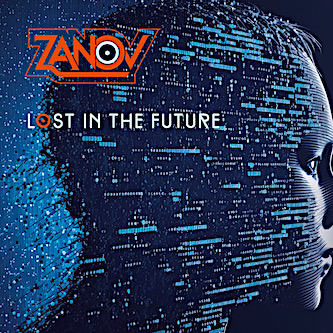 One of the original French synth music masters from the late 1970s, Zanov returns in 2023 with Lost In The Future. When Zanov released his 2020 classic Chaos Islands, some listeners thought it would be a hard act to follow. Filled with haunting melodies, including some of the finest arrangements ever created for the electronic music genre, Chaos Islands was released just at the start of the 2020 pandemic and as such, with all the fear and scarcity, it might have been sadly overlooked. Not enough can be said about the sonic breakthroughs created by Chaos Islands, yet in 2023 it's clearly time for Zanov to make his future music now.
One of the original French synth music masters from the late 1970s, Zanov returns in 2023 with Lost In The Future. When Zanov released his 2020 classic Chaos Islands, some listeners thought it would be a hard act to follow. Filled with haunting melodies, including some of the finest arrangements ever created for the electronic music genre, Chaos Islands was released just at the start of the 2020 pandemic and as such, with all the fear and scarcity, it might have been sadly overlooked. Not enough can be said about the sonic breakthroughs created by Chaos Islands, yet in 2023 it's clearly time for Zanov to make his future music now.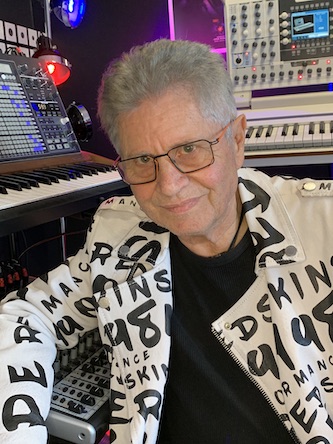 mwe3: What was your strategy in going from Chaos Islands to Lost In The Future? On Chaos Islands you employed various aspects of Chaos Theories. Were there scientific theories and applications involved in creating the Lost In The Future tracks and is there a hidden meaning behind the title?
mwe3: What was your strategy in going from Chaos Islands to Lost In The Future? On Chaos Islands you employed various aspects of Chaos Theories. Were there scientific theories and applications involved in creating the Lost In The Future tracks and is there a hidden meaning behind the title?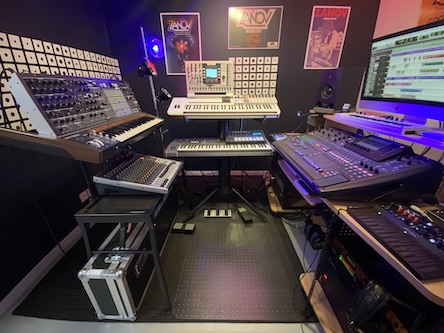 mwe3: You speak about how Lost In The Future explores immersion in a future world. We often hear the terms A.I. and other terms of that nature. On album tracks like “Conscious Machines”, “Extended Life” and “Living With Robots” you explore titles with futuristic meanings. How are these rising aspects of the future going to be compatible with current human life on earth?
mwe3: You speak about how Lost In The Future explores immersion in a future world. We often hear the terms A.I. and other terms of that nature. On album tracks like “Conscious Machines”, “Extended Life” and “Living With Robots” you explore titles with futuristic meanings. How are these rising aspects of the future going to be compatible with current human life on earth?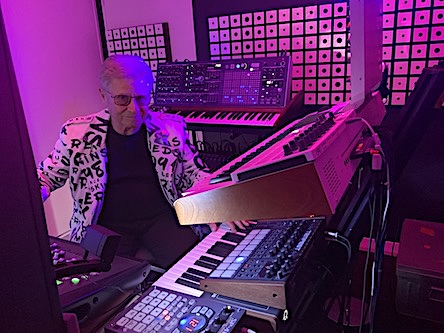 mwe3: You mentioned the term ‘quantum theory’ before and you begin Lost In The Future with the track “Quantum World”. What inspired that track? It is also the longest track on the album.
mwe3: You mentioned the term ‘quantum theory’ before and you begin Lost In The Future with the track “Quantum World”. What inspired that track? It is also the longest track on the album. 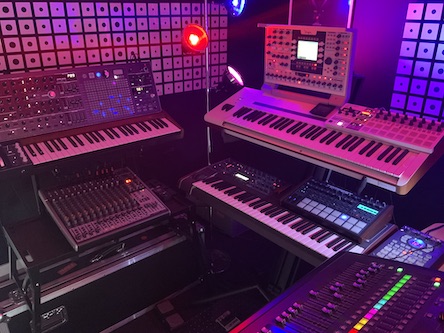 Zanov: Today A.I. is in its infancy and generative A.I. which relies on “Deep Learning” technologies has little to do with human intelligence. It has an advantage over us, which is that it relies on all the knowledge stored on the Internet and on multiple databases, which allows it to create illusions.
Zanov: Today A.I. is in its infancy and generative A.I. which relies on “Deep Learning” technologies has little to do with human intelligence. It has an advantage over us, which is that it relies on all the knowledge stored on the Internet and on multiple databases, which allows it to create illusions. 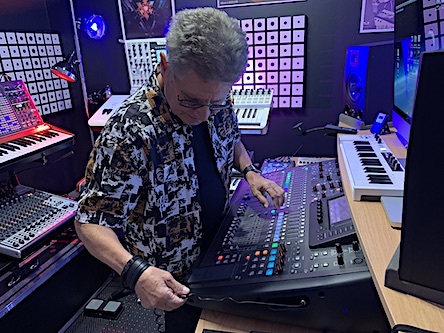 mwe3: There are some great keyboard sounds on “Brain To Brain” and throughout the album, so I wanted to ask about the keyboards you play on Lost In The Future.
mwe3: There are some great keyboard sounds on “Brain To Brain” and throughout the album, so I wanted to ask about the keyboards you play on Lost In The Future.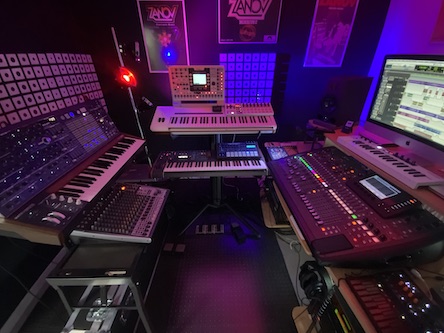 mwe3: Track 5 features “Living With Robots”. Does that song get back to track 2 “Conscious Machines”. The track has a robotic, ominous nature to it. Is that how you see it?
mwe3: Track 5 features “Living With Robots”. Does that song get back to track 2 “Conscious Machines”. The track has a robotic, ominous nature to it. Is that how you see it? 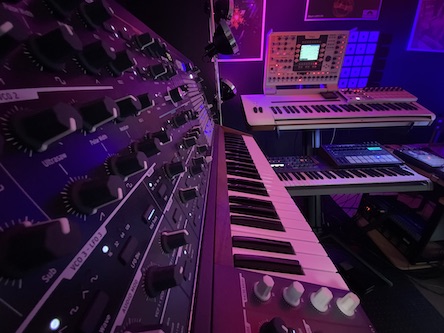 mwe3: Lost In The Future closes with “Time Manipulation”. Everything we do is centered around time and time management so you would think, the ability to manipulate time would be our greatest challenge and hope. What does the track “Time Manipulation” mean to you and why did you close the album with it?
mwe3: Lost In The Future closes with “Time Manipulation”. Everything we do is centered around time and time management so you would think, the ability to manipulate time would be our greatest challenge and hope. What does the track “Time Manipulation” mean to you and why did you close the album with it?